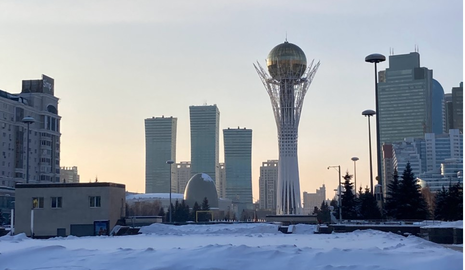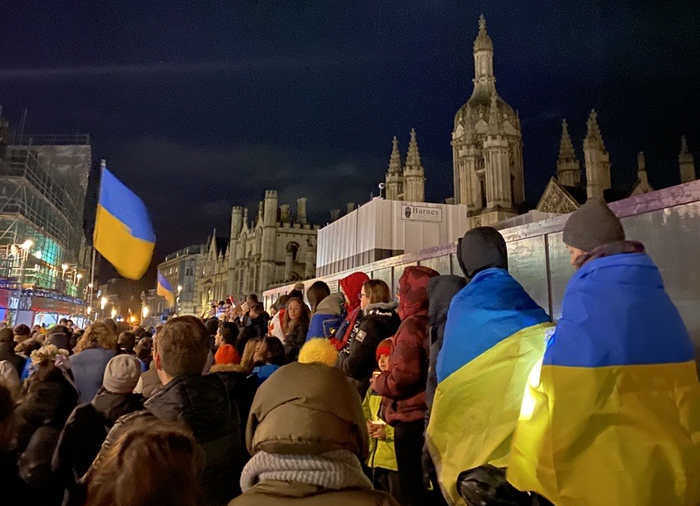Russian in the wake of war
Jasper Maughan contemplates on the moral dilemmas of Russian studies following the invasion of Ukraine

In February 2022, just as I was confirming my course choices at Moscow State University, Russian troops massed at the Ukrainian border. My exchange program was axed almost overnight. The year that has elapsed since then has been a remarkable time to be a student of Slavonic studies. Despite being less than halfway through the degree, my cohort was swiftly forced to confront whether our course of study was defensible. It may sound dramatic to think of a simple supervision or seminar in these terms, but we really did have to call into question whether dedicating our studies to the history, culture and language of a so-called ‘terror state’ could be justified. In the week of the invasion, I can recall the stony silence in a Russian language class, when our teacher asked point-blank if we even wanted the lesson to go ahead.
At the same time, I was also studying Ukrainian and every lecture and supervision facilitated the study of a distinct and fascinating nation and culture, which the Kremlin would have us believe simply do not exist in their own right. Unable to go to Moscow, I initially ended up at the University of Vienna, where I attended Ukrainian language classes. My teacher explained that after the outbreak of war she had refused to continue teaching Russian. Following the bombing of Dnipro in early January, she even vowed to never speak Russian again.
“This complicated postcolonial dynamic in fact warrants the study of Russian”
Such reactions are hardly unwarranted in the face of such extreme violence and brutality, and it is no wonder that students and staff in Slavonic studies in Cambridge were faced with an immediate re-think. Most striking has been the development of a new decolonising approach to Russian studies. The Russian Empire and the Soviet Union, which spread over land to adjacent territory, often don’t spring to mind first when we think of empire. Whereas French studies long ago made the transition to Francophone studies and incorporated African and Caribbean cultures into the field in a more major way, the same cannot be said for Russian. A Russian degree was (until about five minutes ago) very much a ‘Russia’ degree, although its speakers are found in the Baltic states, Belarus, Moldova, the Caucasus, Central Asia and of course Ukraine. The Soviet doctrine of Russification foisted the language of Moscow upon hundreds of millions across a vast territory, but since then it has simply become a fact of life.
We might still wonder whether we should condemn a language for the twisted actions of a government, or even a nation. In the past, the Russian language was undoubtedly weaponised by Moscow and its status often remains fraught, but that is not to say that it has not to some extent been claimed in a positive and productive way. For me, this complicated postcolonial dynamic in fact warrants the study of Russian. Moreover, understanding Russia’s past and present is unquestionably crucial to promoting peace and cooperation today throughout the former Soviet Union.
I am writing this article from Astana, Kazakhstan, a city where almost everyone speaks both Russian and Kazakh, in typical post-Soviet style. Astana simply means ‘capital’ in Kazakh and its futuristic skyline has sprung from the steppe in the last few decades, purpose-built for a newly independent nation. However, it still illustrates the diverse influences on the country; the view from one side of my flat is a Stalinist-esque high rise, but face the other way and you see the shining golden domes of a mosque. The people that I interact with on a daily basis don’t use Russian because they do or don’t support the Kremlin, it is simply part of how they live. In fact, I am told that it is commonplace here in Astana to drop Russian words into Kazakh speech. Various students have gleefully told me that cursing is far more enjoyable in Russian. This is an almost completely bilingual city and after several months I have encountered exactly one local who couldn’t speak Russian. It’s fascinating to be here and learn about a completely new Russophone culture, one so far removed from the Kyivan Rus, Pushkin or the canals of St Petersburg. If I remember correctly, Kazakhstan was mentioned precisely once in my studies thus far in Cambridge, in the context of a mass Soviet agricultural project which devastated the country and unleashed a brutal famine. The lecture then swiftly returned to events firmly on the other side of the Urals.
This year a whole cohort of Russian students is discovering the true diversity of the Russophone world. If we return to Cambridge with an enthusiasm to speak Russian and to study not its culture, but its cultures and their complex intersections, then despite the change’s truly terrible trigger, it strikes me as one of the few upsides.
 News / Caius mourns its tree-mendous loss23 December 2025
News / Caius mourns its tree-mendous loss23 December 2025 News / Clare Hall spent over £500k opposing busway 24 December 2025
News / Clare Hall spent over £500k opposing busway 24 December 2025 Comment / Yes, I’m brown – but I have more important things to say22 December 2025
Comment / Yes, I’m brown – but I have more important things to say22 December 2025 Comment / The ‘class’ of Cambridge24 December 2025
Comment / The ‘class’ of Cambridge24 December 2025 Interviews / Politics, your own way: Tilly Middlehurst on speaking out21 December 2025
Interviews / Politics, your own way: Tilly Middlehurst on speaking out21 December 2025








